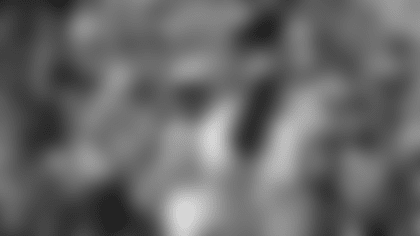On the Kansas City Chiefs: "A big change in personnel, with a wide variety of guys. They've had some injuries, some changes in the secondary; but the scheme for the most part is the same. They've done a good job of being efficient on third downs and red zone. That's where they've made their hay. They've given up some yards, but they're doing a good job on third downs and red zone to get off the field. Good pass rushers again with [Tamba] Hali and Justin Houston, two good edge rushers in back-to-back weeks for us to contend with."
On how the Chiefs have changed without Romeo Crennel calling plays on defense: "It hasn't changed too much, but there's probably been a little less scheme involved, a little more simplified. I think that's not so much because of the play-callers, but because they've changed their personnel so much. They've had the injury at the free safety spot; they've changed their linebackers at a couple of different spots. They've had to simplify because there are so many new guys, especially in the secondary."
On Rod Streater's performance: "He's a great example of a rookie campaign, and how there's some good, and there's some bad, there's some good, and there's some bad. The season's long for a rookie. You've got to think about their normal season being a 12-game, if that, season. On top of that, four preseason games along with the 16 regular season games makes a long year for a rookie. I've been very pleased, though, to see the progress he's made as of late, and making good strides the last couple of weeks."
On Carson Palmer saying Streater's not like a rookie: "He is. He's got pretty good savvy for a rookie. From that standpoint, I agree with Carson. It's not too big for him. He shows a great sense of calmness and awareness during the game. He still has some mistakes and some things he can improve on obviously, as most rookies do."
On Streater coming from Temple and not having a lot of catches: "You would think that the learning curve would be a lot higher for this kid, but he's made it a fairly smooth transition."
On the players' need to study: "I take great pride when I install in front of the group. Both of my parents were teachers. From day one I've taught how important it is to not just take it in the classroom, but to go home and do something with it. I've instructed the coaches to create tests on a weekly basis and emphasize to the players that it's not just what you do in the classroom. If you want to get to your second contract, get to your third contract, you study on Wednesday, Thursday, and Friday, so the game comes slower for you on Sunday because you know your assignments and you know what to do against different looks. If you just do what's the minimum in the classroom, you're not going to get to extend your career much."
On how Chiefs S Eric Berry looks on film: "Really good. When you look back earlier in the year, they matched him up against Antonio Gates against San Diego. He's a very good safety in my opinion, that is not just one-dimensional. Sometimes safeties can be a box safety, or a deep safety; he plays both well. He's got great range to play the middle safety, but he has no problem playing linebacker. In fact, in their sub-packages, he will play the linebacker a majority of the time, and he'll stick his nose in there. He's good against the run, and he can cover a tight end really well."
On his confidence in the offensive system: "I'm a firm believer in the scheme. I've been to too many places, and had too much experience, to know that it's a very productive scheme. But like it is for anywhere, when coaching changes occur, you want the coaches who are the teachers to teach what they know best. If you do that with the coaches, they're going to have answers for the issues that come up during the season. Just like we talked about Rod Streater's performance, we've had those kinds of ups and downs. Early on we couldn't run the ball worth a lick, and then at about the middle of the year we got improvement in the run game. In the passing game, we've had inconsistency when it comes to protection and catching the ball consistently. We've had some high moments too. There have been some growing pains, but its part of the transition. You'd much rather have a coach come in and teach what he knows best, than have him teach a system that he doesn't know at all. That's going to take some time."
On whether he's surprised that it's taken this long: "No, every place I've been to it's usually going to take at least a year's transition time to get everything taught, and the parts we've changed. You've got to remember, we've changed both linemen; we talked about the center and the tackle earlier that played quite a bit. Our top two running backs went down in the same game, and we converted a fullback to running back. Then we had some young receivers that were learning how to play the game at this level as well as learning a new system. To me, if you take a business structure and you make those changes, it's going to take a year's time to process everything and learn it. Once they master it, you can add to it. Right now that's taking some time."
On the line between having players adjust to a scheme and formatting the scheme to fit the players: "Watching enough football through the years, most of the schemes are somewhat similar. To me, it's more of just transitioning new guys together. We had a pretty good influx of changing the O-line positions around, new receivers coming in that are contributing, the two young guys are contributing a lot, a tight end that was never a starter before getting a lot of transition, all those parts change. It's not that big of a change when it comes to football 101, as far as the different types of route concepts, and the running game. It just takes some time to be more efficient. We've made some progress. I'm very pleased with the fact that we're in the top 10 in passing, and we've improved in the running game the last six weeks. We're not where we need to be in scoring points, and that's where I'd like to get better at is finishing drives, or getting more big plays for touchdowns."
On what he's seen from Dennis Allen in his first season as head coach: "I've never seen any head coach have to go through as much as he has from off-the-field issues. It's been very unique from that standpoint. Obviously we talked about the two deaths, but to have those changes, to have the personnel changes, the issues off the field with some players, that's a lot for a coach to handle. He's handled it beautifully as far as staying the course, teaching what he believes is the right way to do it. He's been trained the right way. His background of being in winning programs and learning is record proof. I've been very impressed with the way he's handled the team and all these unique situations that a lot of head coaches don't go through in a season."
On if he hears or reads outside criticism: "I really don't. I'm such a believer, and we teach the players, only worry about the variables you can control. I can't control that variable, so 'What can I do to help the team win for this next week's game?' is kind of how we keep the focus. I've been in the business long enough to know, if you're not winning, or if you're not moving the ball or scoring points from my perspective, you're going to get criticized. Even when you're winning, you're going to get criticized. At the start of my career, I was in San Francisco for nine years. That was back when they were just finishing the run of five Super Bowls. Even then, when we were winning, you couldn't win well enough. There's always going to be critique. There's always criticism. That's just part of the job."
On what kind of leap they can make next season if they keep a core group of guys on offense: "Hopefully more consistency and higher scoring points. We're not able to keep those drives long enough right now to get the points on the board. By keeping the system in place, and keeping the bulk of the players here, now we keep the drives alive and get our point total up into the mid-20s. That's what you want to be. If you're in the mid-20s to the high-20s, you're going to be in the top 10 in the league in scoring. Ultimately, that's what has to happen. To get 11 guys on the same page you've got to get some reps and experience together. With a year's off-season work at that, and a better understanding of the system, the performance level usually goes up the following season because of that."
On whether he thinks the pieces are in place for next year: "Oh, yeah. I think there's still going to have to be pieces added. It's always an evolving process. I was at Houston the last two years. The first year in Houston we finished I believe at 6-10. That was the fifth year in the system. They had just finished 30th or 32nd in running. All of the sudden a guy named Arian Foster showed up undrafted. You don't know who's going to add. That's a part of this profession. The system is going to be in place, but you're going to change the pieces because of the salary cap and drafting and free agency. Sometimes that guy that comes in fits the system so well that it takes off on itself. There's always going to be change. We look to help add to the system as well next year."

























